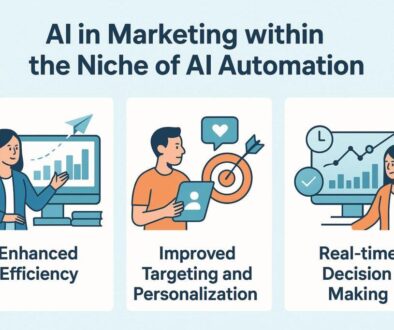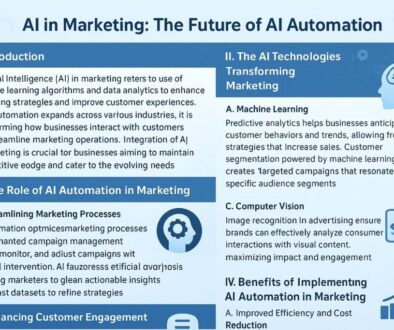AI in Marketing: How Automation is Revolutionizing Strategies for Success
AI in Marketing: Transforming Strategies with AI Automation
I. Introduction
Artificial Intelligence (AI) in marketing refers to the use of AI technologies and algorithms to enhance marketing practices and decision-making. As modern marketing strategies evolve, AI automation is becoming increasingly vital for businesses seeking to improve efficiency, precision, and overall impact. In this article, we will explore key trends in AI marketing automation, highlighting its role in contemporary marketing landscapes.
II. The Role of AI in Marketing Automation
A. Streamlining Campaign Management
AI plays a crucial role in streamlining campaign management tasks. Automated scheduling and execution capabilities allow marketers to launch campaigns with minimal manual intervention, saving time and reducing human error. Moreover, real-time performance tracking enables businesses to measure campaign success and make adjustments on-the-fly, enhancing the effectiveness of marketing efforts.
B. Data-Driven Decision Making
Data-driven decision-making is at the heart of effective marketing. With AI, predictive analytics can uncover insights into customer behavior, enabling marketers to anticipate needs and tailor their strategies accordingly. Consequently, enhanced targeting and segmentation become achievable, allowing businesses to focus their resources on the most promising customer segments.
III. Key Technologies and Tools
A. AI-Powered Marketing Platforms
Several AI-powered marketing platforms streamline processes and improve campaign performance. Notable examples include HubSpot, Marketo, and Salesforce, which offer tools that automate various marketing tasks, from email campaigns to social media management. These platforms harness AI to provide insights and optimize marketing workflows, driving better results.
B. Machine Learning Algorithms in Advertising
Machine learning algorithms play a pivotal role in modern advertising techniques. Programmatic advertising utilizes AI to automate the buying and selling of ad space, optimizing ad delivery for higher engagement. Dynamic A/B testing, driven by machine learning, allows marketers to quickly assess which ad variations perform best, leading to enhanced campaign optimization.
IV. Benefits of AI Automation in Marketing
A. Increased Efficiency and Productivity
The integration of AI automation dramatically increases efficiency and productivity within marketing teams. By reducing manual tasks, marketers can focus on strategic initiatives, fostering creativity and innovation. Additionally, AI aids in optimizing resource allocation by assessing performance metrics, ensuring that marketing budgets are utilized efficiently.
B. Improved Customer Experience
AI automation significantly enhances the customer experience through personalized communication. By leveraging customer data, businesses can deliver tailored messages that resonate with individual preferences. Furthermore, the implementation of chatbots facilitates immediate engagement, addressing customer inquiries swiftly and improving user satisfaction.
C. Higher ROI and Conversion Rates
With AI-driven marketing automation, companies can expect higher return on investment (ROI) and improved conversion rates. Automated lead scoring assesses prospects based on their likelihood to convert, allowing marketing teams to prioritize high-value leads. Additionally, retargeting campaigns leverage AI to remind customers of products they've shown interest in, increasing the chances of conversion.
V. Challenges and Considerations
A. Data Privacy and Compliance Issues
As businesses harness AI for marketing, they must navigate data privacy and compliance issues. Adherence to regulations like GDPR is crucial to maintain customer trust and avoid legal ramifications. Companies must establish robust data governance practices that ensure ethical handling of customer information.
B. Over-Reliance on Automation
While automation offers several benefits, an over-reliance on AI tools can be detrimental. Striking a balance between human touch and AI is imperative in maintaining authentic customer relationships. Businesses should blend automated processes with personalized interactions to foster deeper connections with their audience.
C. Integration with Existing Systems
Integrating AI tools with existing marketing systems presents challenges that need careful consideration. Ensuring compatibility and scalability is essential to avoid disruptions in marketing operations. A well-planned integration strategy can facilitate the seamless adoption of AI technologies without compromising current workflows.
VI. Future Trends in AI Marketing Automation
A. Advancements in Natural Language Processing
Advancements in natural language processing (NLP) are set to revolutionize AI marketing automation. As NLP technologies improve, businesses will be able to analyze and respond to customer inquiries more effectively, enhancing engagement and satisfaction. This development will also enable more sophisticated content generation and sentiment analysis.
B. The Rise of Voice-Activated Marketing
The rise of voice-activated technology presents new opportunities for marketers to engage with customers. AI-driven voice recognition allows brands to connect with users through voice search and personalized voice interactions. Adapting marketing strategies to include voice-activated platforms will be essential for staying ahead in the competitive landscape.
C. Increased Focus on Ethical AI Practices
As AI becomes a larger part of marketing, the focus on ethical AI practices will intensify. Companies will need to prioritize transparency and accountability in their AI applications to build trust with consumers. By adopting ethical guidelines, businesses can navigate potential pitfalls while harnessing the power of AI effectively.
VII. Case Studies
A. Successful Implementations of AI in Marketing Automation
Numerous brands have successfully implemented AI in their marketing automation strategies. For instance, Coca-Cola has leveraged machine learning to analyze consumer preferences, tailoring campaigns that resonate with their audience. Such initiatives highlight the transformative potential of AI-driven marketing approaches.
B. Analysis of Results and Impact
Examining the results of these implementations illustrates the significant impact AI can have on marketing outcomes. Case studies reveal improved engagement rates, higher conversion metrics, and enhanced customer satisfaction. These outcomes validate the strategic investment in AI marketing automation as a driver of business success.
VIII. Conclusion
In summary, AI's potential in marketing automation is vast, offering businesses the tools to enhance efficiency, productivity, and customer experience. As AI technologies evolve, organizations that adapt and adopt these innovations will have a competitive edge in their marketing efforts. The future of AI in marketing looks promising, marking a transformative era in how brands connect and engage with their customers.
IX. Call to Action
Explore AI tools tailored to your marketing needs and discover the benefits of automation. Share your experiences and insights on AI in marketing to contribute to the ongoing conversation about the future of this exciting field. Embrace the change and unlock the full potential of AI in your marketing strategy today.



